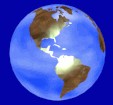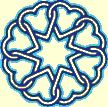



Reverend Jelalludin Rudi Gelsey
Rudolf C. Gelsey, born in Vienna, Austria, came to North America in 1949. He holds a graduate degree in political science from the Universityof Geneva, Switzerland and a Bachelor of Divinity degree from the University of Chicago.He also pursued doctoral studies at the Graduate Institute of International Studies in Geneva. From 1947-1949, Gelsey directed Paris’ Union Federaliste Inter-Universitaire which promoted a European Union. He also worked with Abbé Pierre who, at the time, was President of the World Federalist Movement. When Europe split into antagonistic spheres of influence after World War II, Reverend Gelsey left for Canada. Gelsey found a spiritual home at the Unitarian Church of the Messiah in Montreal.
Joe Scarpaci of Roanoke, near Blacksburg, Virginia where Gelsey served as minister, said: I liked him at once, at first sight. He exuded goodness. A Chris Crinkle twinkle in his eyes, a perennial smile, an often unruly mane of thick white hair you want to go up and touch, his delightful "Old World" accent lacing his American English. He is tolerant; he is a pragmatist, a strategist. He has practiced what he preaches. He is a messenger of peace who believes strongly in the power of the word, the power of the human spirit. We would all do well to emulate him spiritually, whether our path is Jewish, Christian, Islamic, Buddhist, Hindu, or indigenous. He is a truly big man in spirit. All big men are dreamers. His dreams for peace and goodwill in our Global Village make him a giant in my eyes.
Gelsey was a Unitarian Universalist minister, ordained in 1962, and honored for 50 years of service by the Unitarian Universalist Minister’s Association. What attracted him to Unitarianism was the principle of freedom of conscience, the absence of dogma. He ministered to congregations in Philadelphia, Detroit, North Westchester County and Buffalo, New York, and, as mentioned earlier, Blacksburg, Virginia. During this time he encompassed civil rights in support of Dr. Martin Luther King, Jr., beginning in Selma, Alabama in 1965, which led to the Civil Rights Act during the Presidency of Lyndon Johnson. Peace activism and protection of the environment were also causes Gelsey supported. He received a Martin Luther King Award for making a significant contribution to race relations, an award from East Mount-Airy Neighbors in Philadelphia for making “a community come alive,” and awards from the city council of Philadelphia and the Senate of the commonwealth of Pennsylvania. The city of Detroit also presented him with an award for his community work.
In the area of pastoral care, therapeutic interventions, and grief work, Gelsey trained and was certified in the field of clinical transactional analysis. In the area of spirituality and meditation, Gelsey was initiated into the Sufi Order of the West in 1984. He was given the Sufi name Jelal’uddin meaning “the power of faith.” Heunderwent initiation into Buddhism by ThichNhatHanh, a world-renowned monk from Vietnam who now has teaching centers in France and the United States. Gelsey’s Buddhist name is Joyful Bodhisattva of the Heart. He has benefited from many mentors such as Jean Houston at her year-long Mystery School, the writings of Joseph Campbell,the offerings of Matthew Fox in Western spirituality, and the insights of Aramaic scholar Neil Douglas-Klotz (Murshid Saadi Shakur Chishti). For over a decade, Gelsey led Sufi dances, also known as Dances of Universal Peace, and often described as prayer in movement. His understanding of Sufism is expressed in the following words of his:
Toward the wholeness and holiness
of compassion and forgiveness,
Toward the splendor of unity with diversity,
the wonder of reconciliation and harmony;
Toward justice and mercy,
truth and paradox,
struggle and peace.
Those precious qualities and realities
that unite in body, mind and soul,
embody the spirit of guidance.
Reverend Gelsey traveled to Japan, South Korea, India, Israel, Egypt, and Morocco to discern how different world religions were practiced, past and present. He became active in interfaith associations and relations, presenting “A Faith for the Global Village:a Dialogue among Religions in Search of Mutual Appreciation,”at the 1993 Chicago Parliament of World Religions. Gelsey also attended the 2004 Parliament of World Religions conference inBarcelona. In a world traumatized by religious fanaticism and terrorism, Gelsey advocates for mutual understanding and cooperation in race, religion, and international affairs, offering a vision of spiritual oneness and harmony.
Gelsey has authored a new version of the Hebrew Bible, Imagine…A New Bible (1982), written to foster peacemaking and nonviolence, gender-partnership, and responsible stewardship of the earth.In 2004, he published Conversations with Sacred Masters: Bringing the World Together, an imaginary, fruitful exchange of ideas leading to mutual understanding among Goddess Isis, Moses, Jesus, Muhammad, Buddha, and Shiva.Mending Our Broken World: A Path to Perpetual Peace in 2012 (now available on Amazon.com) presents the idea that, while religion has a checkered history, all have common origins inviting us to live together in sacred harmony and unity. Gelsey points out that we are at a critical juncture in human history. He proposes a revival of the glorious legacy of 2,800 years of Perennial Philosophy, an oft-neglected foundation for harmony and world peace. Gelsey’s book shows how to abandon the destructive ways of war and move to a peaceful world federation without national armies and weapons of mass destruction. He shows how adopting such a world federal system can cover the needs of our planet, like peaceful conflict resolution and the sustainable environment. Reforming the United Nations by eliminating the veto power in the UN Security Council and making it an institution based on equality rather than hierarchy provides a solid foundation for Perpetual Peace.